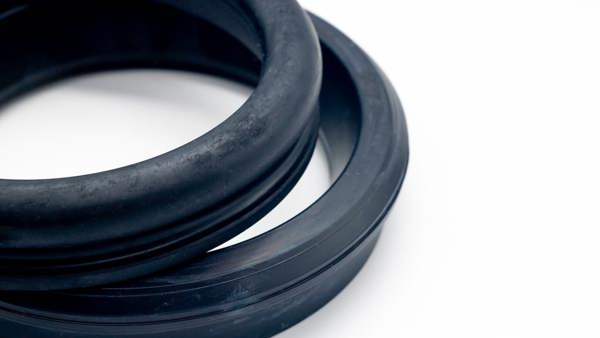
The wrong mix of chemicals and rubber materials is a quick path to part failure. There are a wide variety of both chemical substances and rubber compounds, which can make identifying the right material rather difficult. Let’s break down some common rubber materials and which chemicals they’re resistant to (and which ones will cause them to degrade).
EPDM Chemical Resistances
EPDM (Ethylene Propylene Diene Monomer) is a versatile rubber well-regarded for its durability, including resistance to several chemical substances.
Chemicals EPDM is Resistant To:
- Acids and corrosive materials
- Alkalies
- Oxygenated solvents
- Alcohols
- Acetones
- Ketones
- Esters
Chemicals That Can Degrade EPDM:
- Oils (petroleum-based)
- Aromatic hydrocarbons (benzene, toluene, etc.)
- Chlorinated solvents
Viton Chemical Resistances
Viton (Fluoroelastomer) is a high-performance elastomer built for use in demanding environments. Parts made with Viton are compatible with several different chemicals.
Chemicals Viton is Resistant To:
- Acids
- Alkalies
- Oils (petroleum-based and synthetic)
- Fuels
- Solvents (aromatic and aliphatic)
- Chlorinated solvents
Chemicals That Can Degrade Viton:
- Ammonia
- Amines
- Hot, concentrated caustic solutions
Silicone Chemical Resistances
Silicone is a common rubber material used for high-temperature environments and offers resistance to a wide range of chemicals and solvents.
Chemicals Silicone is Resistant To:
- Acids (dilute)
- Alkalies
- Oxygenated solvents
- Alcohols
- Ketones
- Esters
- Oils (petroleum-based and synthetic)
Chemicals That Can Degrade Silicone:
- Concentrated acids
- Aromatic hydrocarbons (benzene, toluene, etc.)
- Chlorinated solvents
Nitrile Chemical Resistances
Nitrile (NBR) is one of the best rubber materials available for superior oil resistance, but there are other chemicals that can pose problems.
Chemicals Nitrile is Resistant To:
- Oils (petroleum-based)
- Fuels
- Greases
- Hydraulic fluids
- Alcohols
- Vegetable oils
Chemicals That Can Degrade Nitrile:
- Acids (strong and weak)
- Alkalies
- Oxygenated solvents
- Ketones
- Esters
- Aromatic hydrocarbons
- Chlorinated solvents
Neoprene Chemical Resistances
Like Nitrile, Neoprene is another part commonly used for environments with oil exposure. It can also withstand a variety of other substances, such as methyl and ethyl alcohols.
Chemicals Neoprene is Resistant To:
- Acids (dilute)
- Alkalies
- Oxygenated solvents
- Alcohols
- Ketones
- Esters
- Oils (petroleum-based and synthetic)
Chemicals That Can Degrade Neoprene:
- Concentrated acids
- Aromatic hydrocarbons
- Chlorinated solvents
PVC Chemical Resistances
PVC (polyvinyl chloride) is a thermoplastic known for being a strong, lightweight material that can be either rigid or flexible. PVC is also an appealing option for a variety of chemicals, although some more concentrated substances can cause issues.
Chemicals PVC is Resistant To:
- Acids (dilute)
- Alkalies
- Alcohols
- Oils (petroleum-based and synthetic)
- Aromatic hydrocarbons
Chemicals That Can Degrade PVC:
- Concentrated acids
- Chlorinated solvents
- Ketones
- Esters
TPE Chemical Resistances
TPE (thermoplastic elastomers) is a performance rubber that’s processed like plastic. This soft, flexible material offers some chemical resistances, but can struggle with others.
Chemicals TPE is Resistant To:
- Acids (dilute)
- Alkalies
- Alcohols
- Solvents
Chemicals That Can Degrade TPE:
- Concentrated acids
- Aromatic hydrocarbons
- Chlorinated solvents
- Ketones
- Esters
- Oils (petroleum-based and synthetic)
Butyl Chemical Resistances
Butyl rubber is an excellent rubber for applications that require shock absorption or gas impermeability. These qualities, along with some notable resistances to chemicals and other environmental challenges make butyl an effective choice for sealing, lining, and mounting.
Chemicals Butyl is Resistant To:
- Acids (dilute)
- Alkalies
- Oxygenated solvents
- Alcohols
Chemicals That Can Degrade Butyl:
- Concentrated acids
- Aromatic hydrocarbons
- Chlorinated solvents
- Ketones
- Esters
- Oils (petroleum-based and synthetic)
Natural Rubber Chemical Resistances
Natural rubber is an excellent material for parts that demand resistance to abrasion and regular physical contact. However, natural rubber doesn’t fare as well when exposed to most chemicals.
Chemicals Natural Rubber is Resistant To:
- Acids (dilute)
- Alcohols
Chemicals That Can Degrade Natural Rubber:
- Concentrated acids
- Alkalies
- Oxygenated solvents
- Ketones
- Esters
- Aromatic hydrocarbons
- Chlorinated solvents
- Oils (petroleum-based and synthetic)
Find the Right Chemical-Resistant Rubber for Your Parts
While the information above can provide general guidelines, chemical resistances can differ from one specific formulation of rubber to another. Fortunately, Timco helps businesses identify the right rubber material for their performance needs and budget. Give us a call at 800-969-6242 or contact us online to have one of our experts design and supply the right parts for your applications.
